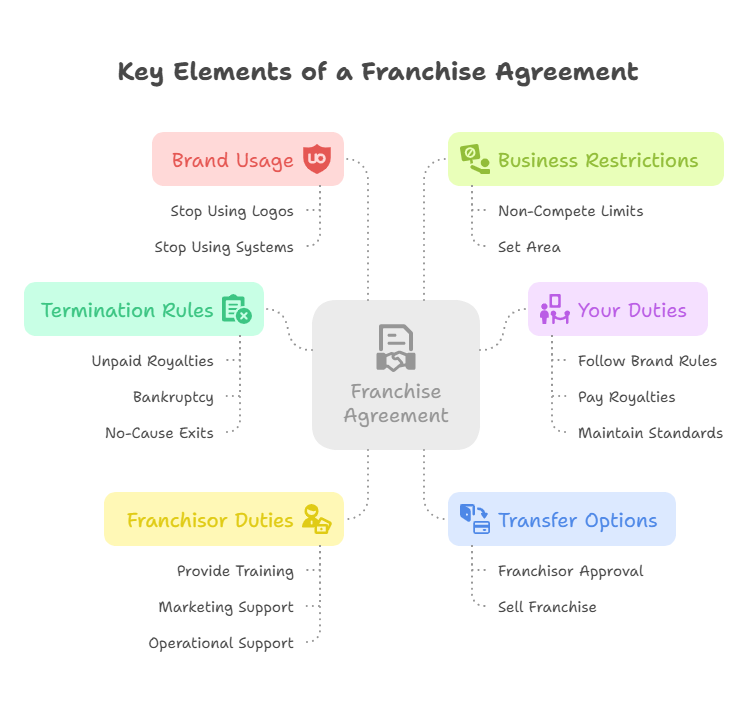Ending a franchise agreement in Canada can be a complex process. You may face financial penalties, legal disputes, or restrictive clauses that limit future business ventures. Franchisees often seek to exit due to financial challenges, disagreements with franchisors, or personal life changes. Franchisors may also initiate termination to protect their brand.
This guide explains the legal steps to terminate a franchise agreement. It focuses on Canadian regulations, like the Arthur Wishart Act, and offers practical advice. You will learn how to navigate risks and protect your interests. By the end of this guide, you’ll know how to:
- Identify valid reasons for termination under Canadian law.
- Understand key contract terms and protections.
- Follow a step-by-step process to exit safely.
- Manage risks like penalties and non-compete clauses.
- Use dispute resolution to avoid costly lawsuits.
From Breach to Bankruptcy: What Ends a Franchise Deal
Franchise agreements are legal contracts. Sometimes, you may need to end them. As a franchisee, you might face issues that make the business hard to sustain. Common reasons include:
- Financial strain: Low sales or high royalty fees can hurt your budget. A Toronto franchisee running a bakery saw profits drop due to new competitors. They decided to exit.
- Franchisor conflicts: Lack of support, like poor training or marketing, can cause tension. A Vancouver franchisee noted their franchisor failed to provide promised ads. This led to a termination request.
- Life changes: Moving, retiring, or health problems may force an exit. A franchisee relocating to Alberta needed to end their contract early.
- Brand standards: Strict rules, like specific decor or hours, can be tough to follow. New franchisees often struggle here.
Franchisors may end agreements if you miss royalty payments or harm the brand. The Arthur Wishart Act in Ontario requires good faith from both sides. Other provinces, like British Columbia, have similar laws. These protect you but also enforce your duties. A Calgary franchisee used the Act to challenge an unfair termination attempt. Knowing your reasons helps you prepare for negotiations or legal steps.
Key Elements of a Franchise Agreement

Your franchise agreement controls if, when, and how you can exit. The Franchise Disclosure Document (FDD) must be provided at least 14 days before signing or paying in disclosure provinces. Learn the difference between a contract and disclosure in franchise agreement vs disclosure document and review the federal-provincial nuances in the Canada Franchise Disclosure Document guide.
Focus on these parts:
- Termination rules: They list when you or the franchisor can end the contract. “Good cause” like unpaid royalties or bankruptcy is common. Some allow exits without cause, but fees apply.
- Your duties: You must follow brand rules, pay royalties, and keep standards. Breaking these, like using wrong suppliers, lets the franchisor act.
- Franchisor duties: They owe you support, like training or marketing. If they fail, you may have grounds to exit.
- Transfer options: Selling your franchise to someone else is possible. Franchisors usually need to approve the buyer.
- Brand usage: After termination, you stop using the franchisor’s logos or systems. This protects their brand.
- Business restrictions: Non-compete clauses block you from starting a similar business. Limits often last 1-2 years in a set area.
The Arthur Wishart Act ensures clear FDD terms. A franchisee in Ottawa found a clause banning competition within 40 kilometers for 18 months. If the FDD lacks key details, you can cancel the contract within two years. An Alberta franchisee recovered $90,000 due to missing financial data. Review these terms carefully to plan your exit.
How to Get Out of a Franchise Agreement in Canada
Exiting a franchise agreement in Canada can be challenging, but with the right approach, it’s possible to terminate without significant penalties. Here are the key steps to breaking a franchise agreement:
-
Review the Franchise Agreement: Carefully check the terms of your franchisor-franchisee agreement. This includes termination clauses that outline the specific conditions under which you can end the contract.
-
Understand Termination Grounds: Common grounds for franchise termination include breach of franchise conditions, failure of the franchisor to provide promised support, or personal circumstances like relocation. The Arthur Wishart Act in Ontario protects franchisees if the franchisor fails to meet its obligations.
-
Consult a Franchise Lawyer: If you’re looking for legal advice or help with disputes, consult a franchise lawyer. They can help you understand your rights under the Alberta Franchise Act or similar provincial laws, and guide you through the franchise dispute resolution process.
-
Negotiate a Mutual Exit: Before resorting to formal termination, try negotiating a mutually beneficial exit with your franchisor. This can sometimes avoid penalties and lawsuits.
-
Dispute Resolution: If the franchisor is uncooperative, legal actions such as mediation or arbitration can resolve the conflict without going to court.
-
Know Your Post-Termination Obligations: Be aware of any non-compete clauses or other post-termination obligations, such as returning branded materials or paying any outstanding fees.
-
Legal Protections: Under laws like the Arthur Wishart Act in Ontario, you can cancel a franchise agreement if the Franchise Disclosure Document (FDD) is incomplete or inaccurate.
By understanding your contract and local franchise laws, such as those in Ontario, Alberta, and British Columbia, and seeking legal guidance, you can exit your franchise agreement smoothly and protect your interests.
Steps to Terminate a Franchise Agreement in Canada
Terminating a franchise agreement in Canada needs a clear plan. The franchise agreement termination process avoids legal or financial trouble. Follow these steps:
- Check the Contract and FDD
Identify termination, notice, and cure periods (often 30–60 days). Confirm whether the FDD was delivered on time and complete. If not, your rights are stronger. See Franchise Agreement vs Disclosure Document and the Canada FDD guide.
- Track Problems
Write down reasons for leaving, like losses or franchisor issues. Save emails showing missed training or late supplies. A Mississauga franchisee used supply delay records to exit without a $45,000 fee.
- Look at Selling Options
If you can’t terminate, try selling the franchise. Franchisors often approve buyers but may charge fees. An Edmonton franchisee sold their business after checking transfer rules. They got back some investment.
- Get Legal Help
A lawyer reviews your contract and spots risks. They ensure you follow Canadian laws. Our team has helped franchisees use the Arthur Wishart Act to protect their rights.
- Negotiate or Give Formal Notice
Start with a mutual termination proposal (release + fee relief + transition plan). If that fails, serve formal notice exactly as the contract requires. For broader strategy, see How to break a franchise agreement in Canada.
Explore your legal options with a franchise lawyer to exit your agreement smoothly.
Risks and Consequences of Termination
Ending a franchise agreement has risks. The Arthur Wishart Act offers protections, but mistakes can cost you. Consider these risks:
- Penalties: You may owe termination fees or unpaid royalties. A franchisee we advised faced a $70,000 fee. They cut it by showing franchisor errors.
- Business limits: Non-compete clauses stop you from running a similar business. A Hamilton franchisee couldn’t open a new restaurant for 18 months within 50 kilometers.
- Contract violations: Skipping notice periods risks lawsuits. Franchisors may claim lost future profits. A Toronto franchisee avoided a $110,000 suit by following a 60-day cure period.
- Brand issues: You must stop using the franchisor’s logos. A franchisee faced fines for keeping branded signs.
- Reputation harm: Disputes can hurt your industry standing. This affects future business deals.
A Calgary franchisee dodged penalties by proving the FDD was incomplete. Know these risks to plan a safe exit.
Dispute Resolution Options
Disputes happen during termination. The Arthur Wishart Act supports fair solutions. Here are your options:
- Mediation: A neutral person helps you agree with the franchisor. It’s private and saves money. A client settled a royalty dispute this way, avoiding court.
- Arbitration: An arbitrator decides the outcome. It’s faster than court but binding. A Toronto franchisee used arbitration for a territory dispute. They saved time.
- Litigation: If other methods fail, you may sue. It’s costly and public. A client won $80,000 after proving the franchisor gave false FDD data.
Your agreement often dictates the forum. A legal strategy session can map leverage points and timelines: start with legal steps for starting (and exiting) a franchise in Canada to understand sequencing.
Canadian Franchise Laws and Protections
The Arthur Wishart Act in Ontario shapes franchise rules. British Columbia and Alberta have similar laws. Franchisors must provide a full FDD with financials and termination details. If the FDD is wrong, you can cancel within two years. An Alberta franchisee got back $100,000 for missing data. Good faith is required. Quebec’s civil law may change your rights. Know your province’s rules.
Financial Implications of Termination
You may owe debts after termination, like supplier fees or leases. Some contracts demand repayment of franchisor costs. A Toronto franchisee cut a $30,000 repayment by showing franchisor faults. Non-compete clauses delay new businesses, hurting income. The Arthur Wishart Act requires cost disclosure. Plan your finances to cover these gaps.
Post-Termination Obligations
After exiting, stop using the franchisor’s brand. Return manuals or equipment. Follow non-compete clauses. Pay any debts. A franchisee faced fines for keeping signs. The Arthur Wishart Act keeps rules fair. An Ottawa client avoided trouble by returning assets fast.
Practical Tips for a Smooth Exit
To exit well:
- Save Records: Keep emails and sales data. A franchisee proved losses to win talks.
- Talk Early: Discuss issues with the franchisor. A client found a mutual exit this way.
- Check Market: If selling, study demand. A Calgary franchisee faced delays due to low interest.
- Plan Money: Save for costs after exit. A client budgeted for a year without income.
Client Testimonial
A Toronto franchisee ran an unprofitable fast-food business. The location was poor. They feared penalties and a lawsuit. Our team found the franchisor failed to provide marketing support. We negotiated a mutual termination. This saved $75,000 in fees. The franchisee said our clear advice made the process easy. This shows how legal support can simplify a tough exit. It protects your money and reputation.
Why Choose Cloudhaus Law for Franchise Termination? We Put Your Needs First
We’ve helped more than 80 franchise locations across Canada set up their legal structures the right way from the start. Whether you’re buying your first unit or scaling to a multi-unit enterprise, the legal groundwork matters.
At Cloudhaus Law, we provide:
- Flat-fee pricing, so there are no billing surprises
- Legal support from a dual-licensed lawyer (Canada/U.S.)
- Experience across industries including retail, food service, and service-based franchises
- Virtual consultations tailored for Ontario and national clients
One client who opened a franchise in Mississauga started with one location. We helped them incorporate, meet franchisor requirements, and later restructure to support two additional units. Their expansion was seamless because their legal base was sound from day one.
Frequently Asked Questions
What is the legal process for breaking a franchise agreement?
The franchise agreement termination process starts with reviewing your contract and FDD. Check termination rules and notice periods. Document issues like franchisor failures. Follow cure periods, often 30-60 days. The Arthur Wishart Act ensures fair dealings. Negotiate a mutual exit or use dispute resolution in franchising. A lawyer reduces risks like lawsuits.
Can I terminate a franchise agreement without penalties?
You can avoid termination fees if the franchisor breaches the contract, like missing support duties. Mutual agreements also help. The Arthur Wishart Act limits unfair fees. A client proved the franchisor skipped FDD details and exited fee-free. Legal advice finds these opportunities.
What are common reasons franchisees break their contracts?
Franchisees exit due to low profits, franchisor disputes, life changes, or tough brand rules. The Arthur Wishart Act protects your rights. A franchisee left after the franchisor delayed supplies. Records proved their case.
How can I negotiate an early exit with the franchisor?
Show proof of issues, like missed training, to negotiate an exit. The Arthur Wishart Act supports fair talks. A Mississauga client saved $50,000 by proving poor support. A lawyer strengthens your negotiation.
Will breaking a franchise agreement affect my credit or business record?
Unpaid fees or lawsuits can hurt your credit. Disputes may harm your industry reputation. A client exited cleanly, avoiding debt. Legal help protects your record.
Do I need a lawyer to end a franchise contract?
A franchise lawyer Toronto clarifies risks and laws. They use the Arthur Wishart Act to protect you. Our team helped franchisees exit without penalties by finding contract flaws.
What clauses in a franchise agreement allow for termination?
Non-payment, insolvency, material breach, legal violations; sometimes convenience with fees. For clarity on your specific contract, speak with a franchise agreement lawyer in Toronto.
Final Thoughts: Exit With Clarity, Not Consequences
Leaving a franchise is never easy, but it doesn’t have to be overwhelming. Whether you’re facing financial pressure, a lack of support, or changing life circumstances, your exit deserves to be handled with legal clarity and confidence. The franchise agreement you signed contains powerful terms, but so does the law protecting you especially under the Arthur Wishart Act.
With the right legal guidance, you can minimize penalties, avoid disputes, and protect your future business interests. At Cloudhaus Law, we help franchisees navigate these exits with strategy and care. You don’t have to face this alone or risk making costly mistakes.
If you’re ready to end your franchise agreement the right way, book a free consultation with Cloudhaus Law today at cloudhauslaw.com/contact or call (647) 965-0516.








